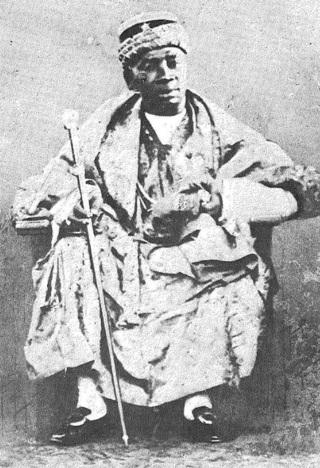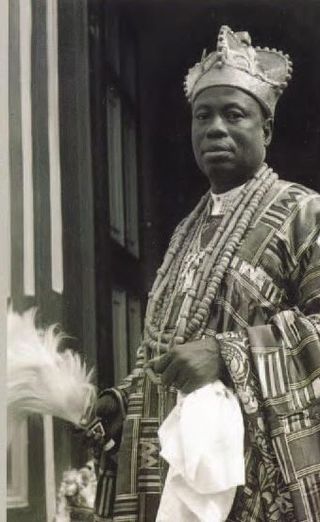Related Research Articles

Efunroye Tinubu, born Ẹfúnpọ̀róyè Ọ̀ṣuntinúbú, was a powerful Yoruba female aristocrat, merchant, and slave trader in pre-colonial and colonial Nigeria.

Lagos is the largest city of the West-African country of Nigeria, and its former capital; it is the largest city in Africa in terms of population with about 15.3 million people. It is also the 4th largest economy in Africa.
The Erelu Kuti of Lagos is the traditional aristocrat charged with the bearing of the ritual essence of Oloye Erelu Kuti I, an eighteenth-century Yoruba royal who aided in the consolidation of her homeland.

The Oba of Lagos, also known as the Eleko of Eko, is the traditional ruler (Oba) of Lagos.
Akitoye, sometimes wrongly referred to as Akintoye, reigned twice as Oba of Lagos; first, from 1841 to 1845, and a second time, from 1851 to 1853. His father was Oba Ologun Kutere and his siblings were Obas Osinlokun and Adele.

Badagry, also spelled Badagri, is a coastal town and Local Government Area (LGA) in Lagos State, Nigeria. It is quite close to the city of Lagos, and located on the north bank of Porto Novo Creek, an inland waterway that connects Lagos to the Beninese capital of Porto-Novo. The same route connects Lagos, Ilaro, and Porto-Novo, and shares a border with the Republic of Benin. As of the preliminary 2006 census results, the municipality had a population of 241,093.
William McCoskry was a British merchant who served as Consul at Lagos, then as acting Governor of Lagos Colony.
The following is a timeline of the history of the metropolis of Lagos, Nigeria.

Oba Sanusi Olusi was a wealthy trader who succeeded Ibikunle Akitoye as Oba of Lagos from 1928 to 1931 during what some historians refer to as the "Interregnum" years of the exiled Oba Eshugbayi Eleko. Oba Sanusi Olusi was a grandson of Olusi, and great grandson of Oba Ologun Kutere. Sanusi Olusi was the first Muslim Oba of Lagos.
'Oba Falolu Dosunmu served as the Oba of Lagos from 1932 to 1949, succeeding Eshugbayi Eleko. He was a former fisherman and a member of the House of Dosunmu.

Oba Sir Musendiku Buraimoh Adeniji Adele II, KBE was the Oba (King) of Lagos from 1 October 1949 to 12 July 1964.
Ologun Kutere reigned as Oba of Lagos from around the 1780s to around 1803. He succeeded Oba Eletu Kekere who reigned between 1775 and 1780. "Ologun" is the Yoruba word for "War General".
Oba Akinsemoyin reigned as Oba of Lagos from around 1704 to 1749. His father was Oba Ado and his siblings were Erelu Kuti and Oba Gabaro, whom he succeeded.

Kosoko was a member of the Ologun Kutere Lagos Royal Family who reigned as Oba of Lagos from 1845 to 1851. His father was Oba Osinlokun and his siblings were Idewu Ojulari, Olufunmi, Odunsi, Ladega, Ogunbambi, Akinsanya, Ogunjobi, Akimosa, Ibiyemi, Adebajo, Matimoju, Adeniyi, Isiyemi, Igbalu, Oresanya, and Idewu-Ojulari.
Chief Oshodi Landuji Tapa was Oba Kosoko's war captain and one of the most powerful chiefs in the Oba of Lagos' court.
Oba Idewu Ojulari reigned as Oba of Lagos from 1829 to about 1834/5. His father was Oba Osinlokun and his siblings were Kosoko and Opo Olu, a wealthy and powerful female slave holder.
Oba Oluwole reigned as Oba of Lagos from 1837 to 1841. His father was Oba Adele.
Oba Adele or Adele Ajosun reigned twice as Oba of Lagos; first, from c1811 to 1821, and a second time from 1835 to 1837. His father was Oba Ologun Kutere and his siblings were Obas Osinlokun and Akitoye, thus the Ologun Kutere line has remained the dominant line in the Obaship of Lagos.
Dosunmu, referred to in British documents as Docemo, reigned as Oba of Lagos from 1853, when he succeeded his father Oba Akitoye, until his own death in 1885. He was forced to run away to Britain under the threat of force in August 1861.
The Eletu Odibo of Lagos is the traditional nobleman that has historically served as the principal kingmaker of the Oba of Lagos. As head of the Akarigbere class of chiefs, the Eletu Odibo also serves as the prime minister of the Oba.
References
- ↑ Mann, Kristin (2007). Slavery and the Birth of an African City: Lagos, 1760-1900. Indiana University Press, 2007. p. 45. ISBN 9780253348845.
- ↑ Smith, Robert (January 1979). The Lagos Consulate, 1851-1861. University of California Press, 1979. pp. 14–17. ISBN 9780520037465.